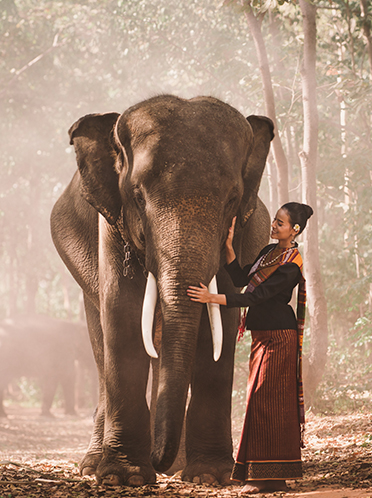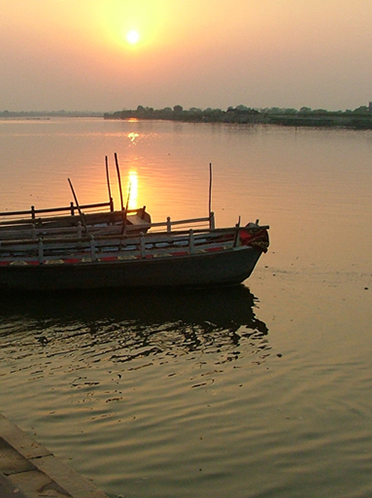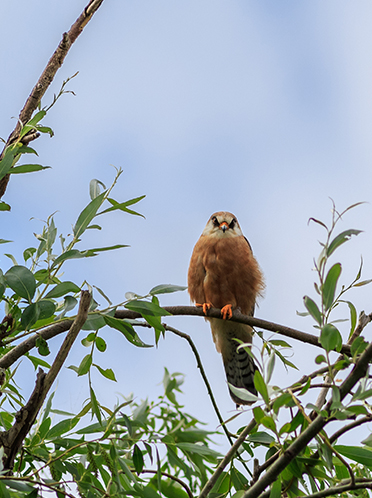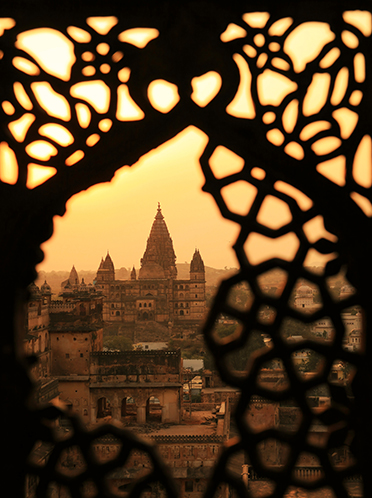
by Ma Muktananda | Mar 14, 2021 | Short Stories
A group of blind men used to go for a daily walk in the care of a guide. One day, the guide suggested they all go to the zoo, and the group enthusiastically agreed. The guide asked the blind men if they wanted to know what an elephant was, to which they assented joyfully. However, since the blind men could only learn about an elephant by touch, they were allowed to enter into a space where they could be with the elephant. Because it was very tame, they all began to feel the elephant. In the process, a huge discussion arose among the blind men, which soon turned into an argument. One of the blind men said:
—”An elephant is like a large hose…”
Another remarked:
—”Noooo! An elephant is like the trunk of a tree…..
A third said:
—”You are completely wrong; an elephant is like a large fan….”
Then the guide, who could see the elephant with his own eyes, interrupted them, and said,
—”Enough of this argument, there is no reason to fight, you are all right. What is happening is that each of you has grasped the elephant from a different angle. The one who said that the elephant is like a hose, grasped his trunk, the one who said it appeared to be like the trunk of a tree, grasped a leg, the one who said it was like a fan, grasped his ear. All of you are correct, and there is no reason to quarrel. Your differences are only due to your blindness.”

by Ma Muktananda | Mar 14, 2021 | Short Stories
On the banks of the Ganges in Rishikesh, a class on jñana-yoga was taking place. The master was explaining that the essence of every one of us is divine. In other words, we are God.
One of the disciples asked,
— “How is it possible that every one of us is God? We are limited beings, while God is infinite. Our knowledge is limited, while God is omniscient. We can only be in one place, whereas God is omnipresent.”
The Guru asked him to take a cup and bring water from the river Ganges.
The disciple did what his master had asked, approaching him with the cup filled with water…
The master then asked,
— “Is this water the Ganges?”
And the disciple responded,
— “Yes, master.”
At which the Guru asked,
— “How is it possible? The Ganges is immense, and contains a great quantity of fish; in the Ganges there are many tortoises, boats are passing and many people enter to bathe. However, this cup of water is small and limited, without fish, without boats… How can it be the water of the Ganges? “
His disciple answered,
— “Of course it is the water of the Ganges, but in a small quantity it obviously cannot contain fish, tortoises, boats or people who enter to bathe.”
— “I completely agree”,
Said the Guru,
— “Now return this water to the river.”
The disciple did what his teacher had asked, and when he returned, the Guru said to him,
— “You are like the water of the Ganges held in a cup. Despite being divine, it appears different, due to its limited form. In returning the water from the cup back to the river, it is returned to its immensity, to once again contain fishes, tortoises, boats and devotees. In each small drop lies the entire ocean.”

by Ma Muktananda | Mar 14, 2021 | Short Stories
The disciple approached a saintly yogi who was completely awakened, to inquire about some aspects of enlightenment and about those who have been fortunate enough to experience it. The disciple asked the Guru:
— “Beloved Master, how is it possible that a jivan-mukta, one enlightened in life, can remain serene and in peace while humanity is suffering and enduring so much tragedy?
The master remained silent for a few moments, and then he replied:
— “Imagine yourself dreaming that you are traveling by ship at night and all the passengers are sleeping. Suddenly, you are walking on the deck and you realize that the ship has begun to sink, which produces enough fear that it awakens you. Now that you are awake, you realize that you were dreaming. And I ask you, now, will you quickly try to fall back to sleep again with the intention of warning the passengers that the ship is sinking, so they can save their lives?”

by Ma Muktananda | Mar 14, 2021 | Short Stories
A king received a fine gift of two precious falcons. The monarch delivered both creatures to a falconry to be trained. .
After some time, the master of the falconry informed the King that one of the falcons was flying majestically in the heights but the other had not moved from his branch since his arrival. The monarch commanded that various experts from his kingdom be called to see if they could find a solution, however, none of them were capable of making the bird fly.
The king commanded that one of the wisest of his counselors be called, and great was his frustration in seeing that no one could make the bird leave his branch and fly.
One of his advisers told him that perhaps the best thing would be to search for a person more accustomed to a life in contact with nature to solve a problem like this.
The king gave the order to search in his kingdom for a farmer who might be able to do something about it.
One morning the king was amazed to see through his window that the bird was flying very high, and immediately said: –
—“Who has done this?”
— “A farmer, your majesty.”
At which the king ordered:
—“Bring me this hero immediately.”
The simple farmer was brought in the presence of the King, who thanked him for his efforts and asked him:
—“So my good man, could you tell me how you were able to convince that falcon to fly?”
To which the farmer replied:
—”“I simply took my tools and cut off the branch, your Majestry.”

by Ma Muktananda | Mar 14, 2021 | Short Stories
A wise sadhu enjoyed great respect throughout the entire kingdom. Therefore, none of the guards dared to stop him when he entered the palace. Recognizing him, the king greeted the sadhu, asking,
—“What is the purpose of your visit, Your Holiness?”
The holy man replied,
—“ There is no particular reason… I was just passing by and I decided to stop to rest and sleep in this inn.”
Extremely surprised, the monarch answered,
—“But this is my royal palace, why do you call it an ‘inn’ ”?
The sadhu said,
—“Your majesty, could you tell me, whom did this palace belong to in the past?”
The king replied,
—“The previous owner was my father, and when he left his body, it became my property.”
So the sage asked him again,
—“And to whom did this palace belong, before your father?”
The king replied,
—“To my grandfather. When he died, the palace became the property of my father.”
The sadhu remained silent for a few moments and then he said with a firm voice,
—“Your majesty, with all my respect, assuming that you are right and this is not an inn… In which way would you call a place where different people live for brief periods of time, leaving afterwards? Is it not appropriate to call it an… inn?”
The monarch invited him to sleep in his palace and named him his personal adviser.






Recent Comments